
The Producers is a 1967 American satirical black comedy film. It was written and directed by Mel Brooks, and stars Zero Mostel, Gene Wilder, Dick Shawn, and Kenneth Mars. The film is about a con artist theater producer and his accountant who scheme to get rich by fraudulently overselling interests in a stage musical designed to fail. To this end, they find a playscript celebrating Adolf Hitler and the Nazis and bring it to the stage. Because of this theme, The Producers was controversial from the start, and received mixed reviews. It became a cult film, and found a more positive critical reception later.

The Exorcist is a 1971 horror novel written by American writer William Peter Blatty and published by Harper & Row. The book details the demonic possession of eleven-year-old Regan MacNeil, the daughter of a famous actress, and the two priests who attempt to exorcise the demon. The novel was the basis of a highly successful film adaptation released two years later, whose screenplay was also written and produced by Blatty. More movies and books were eventually added to The Exorcist franchise.
Peter Hess Stone was an American screenwriter and playwright. Stone is perhaps best remembered by the general public for the screenplays he wrote or co-wrote in the mid-1960s, Charade (1963), Father Goose (1964), and Mirage (1965).

The Ninth Configuration is a 1980 American psychological drama film written, produced, and directed by William Peter Blatty, in his directorial debut. It is the second installment in Blatty's "Trilogy of Faith" after The Exorcist (1973), and followed by The Exorcist III (1990). The film is based on Blatty's 1978 novel The Ninth Configuration, which was itself a reworking of his 1966 novel Twinkle, Twinkle, "Killer" Kane! The initial 1966 publication of the novel featured an exclamation mark at the end of the title, while all subsequent publications saw it removed.
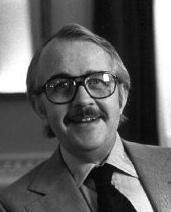
Ernest Ralph Tidyman was an American author and screenwriter, best known for his novels featuring the African-American detective John Shaft. His screenplay for The French Connection garnered him an Academy Award for Best Adapted Screenplay, as well as a Golden Globe Award, a Writers Guild of America Award, and an Edgar Award. In 1971, he also co-wrote the screenplay for the film version of Shaft with John D. F. Black.
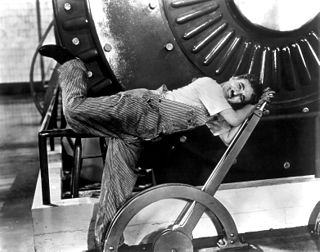
Physical comedy is a form of comedy focused on manipulation of the body for a humorous effect. It can include slapstick, clowning, mime, physical stunts, or making funny faces.

Samuel Joel "Zero" Mostel was an American actor, comedian, and singer. He is best known for his portrayal of comic characters including Tevye on stage in Fiddler on the Roof, Pseudolus on stage and on screen in A Funny Thing Happened on the Way to the Forum, and Max Bialystock in the original film version of Mel Brooks' The Producers (1967). Mostel was a student of Don Richardson and he used an acting technique based on muscle memory. He was blacklisted during the 1950s; his testimony before the House Un-American Activities Committee was well publicized. Mostel later starred in the Hollywood Blacklist drama film The Front (1976) alongside Woody Allen, for which Mostel was nominated for the British Academy Film Award for Best Supporting Actor.
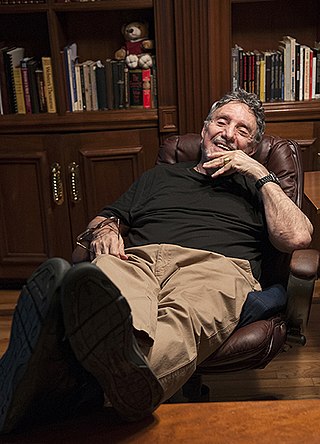
William Peter Blatty was an American writer, director and producer. He is best known for his 1971 novel The Exorcist and for his 1973 screenplay for the film adaptation of the same name. Blatty won an Academy Award for Best Adapted Screenplay for The Exorcist, and was nominated for Best Picture as its producer. The film also earned Blatty a Golden Globe Award for Best Motion Picture – Drama as producer.

The Front is a 1976 American comedy drama film set against the Hollywood blacklist in the 1950s, when artists, writers, directors, and others were rendered unemployable, having been accused of subversive political activities in support of Communism or of being Communists themselves. It was written by Walter Bernstein, directed by Martin Ritt, and stars Woody Allen, Zero Mostel and Michael Murphy.

Sir Christopher James Hampton is a British playwright, screenwriter, translator and film director. He is best known for his play Les Liaisons Dangereuses based on the novel of the same name and the film adaptation. He has thrice received nominations for the Academy Award for Best Adapted Screenplay: for Dangerous Liaisons (1988), Atonement (2007) and The Father (2020); winning for the former and latter.

Latitude Zero is a 1969 tokusatsu science fiction film directed by Ishirō Honda, with special effects by Eiji Tsuburaya. An international co-production of Japan and the United States, it stars Joseph Cotten, Cesar Romero, Akira Takarada, Masumi Okada, Richard Jaeckel, Patricia Medina, and Akihiko Hirata.
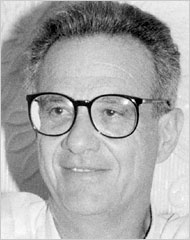
Jerry Belson was an American writer, director, and producer of Hollywood films for over 40 years. Collaborating with figures like Steve Allen and Garry Marshall, Belson gained recognition for his work on various television shows, including The Dick Van Dyke Show and his co-creation of the popular sitcom The Odd Couple. He demonstrated his versatility by venturing into film, co-writing screenplays and directing movies. Belson's impact on comedy and his ability to create enduring characters and relatable narratives left a lasting legacy in the entertainment industry.

The Birthday Party is a 1968 British drama neo noir directed by William Friedkin and starring Robert Shaw. It is based on the 1957 play The Birthday Party by Harold Pinter. The screenplay for the film was written by Pinter as well. The film, and the play, are considered examples of "comedy of menace", a genre associated with Pinter.
Peter L. Steinfeld is an American screenwriter and television producer. He is best known for writing mystery film Drowning Mona, comedy film Be Cool (2005) and drama film 21 (2008).
Dana Fox is an American screenwriter. She is best known as the writer of The Wedding Date (2005), What Happens in Vegas (2008), and the television comedy series Ben and Kate (2012–13).
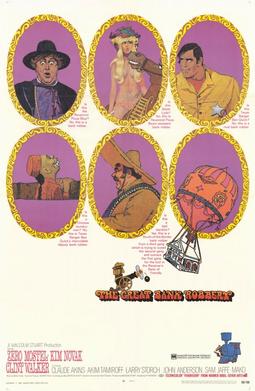
The Great Bank Robbery is a 1969 Western comedy film from Warner Bros. directed by Hy Averback and written by William Peter Blatty, based on the novel by Frank O'Rourke. The movie had a soundtrack with songs by Jimmy Van Heusen.

Hot Millions is a 1968 British caper story feature film made by MGM. It was directed by Eric Till and produced by Mildred Freed Alberg, from a collaborative screenplay by Ira Wallach and star Peter Ustinov. The music score was composed by Laurie Johnson, featuring the single "This Time" by Scottish singer Lulu. The cinematographer was Kenneth Higgins.

The Exorcist III is a 1990 American supernatural horror film written for the screen and directed by William Peter Blatty, based on his 1983 novel Legion. It is the third installment in The Exorcist film series, and the final installment in Blatty's "Trilogy of Faith" after The Ninth Configuration (1980). The film stars George C. Scott, Ed Flanders, Jason Miller, Scott Wilson, Nicol Williamson, and Brad Dourif.
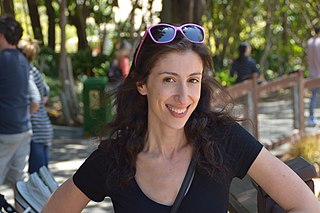
Savion Einstein is an Israeli screenwriter and producer. The daughter of the late sports broadcaster Meir Einstein, she has written numerous advertisements and screenplays. Her work has been recognised with several honours, including a Joplin Award and a nomination for the Nicholl Fellowships in Screenwriting. In 2018, her screenplay Superfecundation was sold to Sony's production company Screen Gems.
















